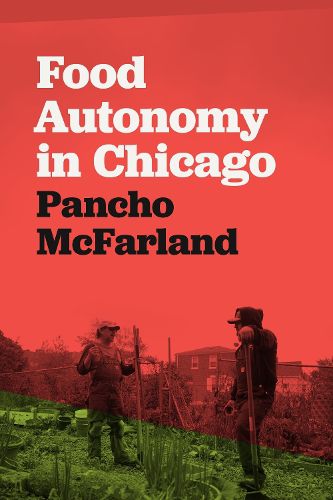Readings Newsletter
Become a Readings Member to make your shopping experience even easier.
Sign in or sign up for free!
You’re not far away from qualifying for FREE standard shipping within Australia
You’ve qualified for FREE standard shipping within Australia
The cart is loading…






Through eighteen years of field research, dialogues with colleagues, deep involvement in the food movement community in Chicago, and introspection, Pancho McFarland asks: Is the loosely connected network of Black and Indigenous land stewards and food warriors in Chicago an anticolonial force for the liberation of all our relations?
This examination of a sector of the food autonomy movement in Chicago provides important new ways of understanding race relations, gender, sexuality, spirituality, pedagogy, identity, and their importance to the dynamics of social movements. Additionally, the book explores how revolutionary culture, principles, and organization of American Indigenous, diasporan Africans, anarchist Mexicans and others have been adopted, adapted, or rejected in our food movement.
In this autoethnography of the food movement, McFarland argues that at our best we work to establish a new society like that theorized and enacted by Indigenous and Black anarchists. However, the forces of Wetiko (colonialism, capitalism, heteropatriarchy, and white supremacy) make the work of BIPOC food warriors difficult. Wetiko's conceptual categories-including race, gender, sexuality, and citizenship-influence our worldviews and affect our behaviors. These limitations and our responses to them are captured in the dialogues and chapters of Food Autonomy in Chicago.
$9.00 standard shipping within Australia
FREE standard shipping within Australia for orders over $100.00
Express & International shipping calculated at checkout
Through eighteen years of field research, dialogues with colleagues, deep involvement in the food movement community in Chicago, and introspection, Pancho McFarland asks: Is the loosely connected network of Black and Indigenous land stewards and food warriors in Chicago an anticolonial force for the liberation of all our relations?
This examination of a sector of the food autonomy movement in Chicago provides important new ways of understanding race relations, gender, sexuality, spirituality, pedagogy, identity, and their importance to the dynamics of social movements. Additionally, the book explores how revolutionary culture, principles, and organization of American Indigenous, diasporan Africans, anarchist Mexicans and others have been adopted, adapted, or rejected in our food movement.
In this autoethnography of the food movement, McFarland argues that at our best we work to establish a new society like that theorized and enacted by Indigenous and Black anarchists. However, the forces of Wetiko (colonialism, capitalism, heteropatriarchy, and white supremacy) make the work of BIPOC food warriors difficult. Wetiko's conceptual categories-including race, gender, sexuality, and citizenship-influence our worldviews and affect our behaviors. These limitations and our responses to them are captured in the dialogues and chapters of Food Autonomy in Chicago.